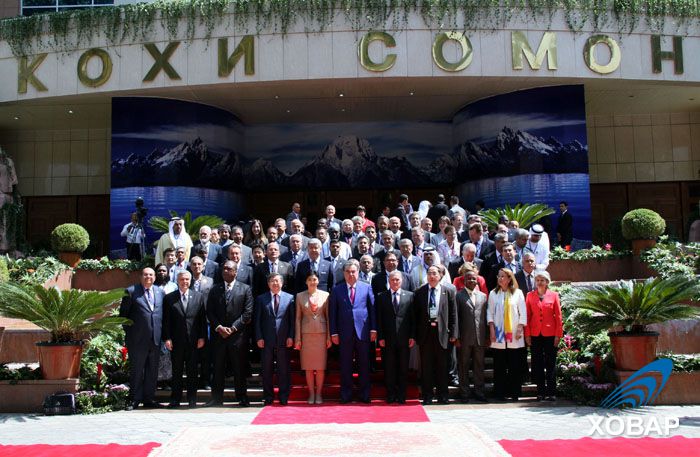DECLARATION OF THE HIGH LEVEL INTERNATIONAL CONFERENCE ON WATER COOPERATION
Dushanbe, Tajikistan, 20-21 August 2013
We, representatives of governments, international and regional organizations and civil society met in Dushanbe, Tajikistan, on 20 and 21 August 2013, at the High Level International Conference on Water Cooperation (HLICWC) to support the implementation of United Nations General Assembly Resolution A/67/204 “Implementation of the International Year of Water Cooperation, 2013,” and to promote actions at all levels to advance cooperation on water. In doing so,
We recognize that the cooperative development and management of transboundary water resources at the basin level is essential for broad-based sustainable social and economic growth, overall human development, poverty and hunger eradication, public health, food security, energy security, environmental protection, disaster prevention, sustainable urban and rural development, resilience to climate change and, importantly, peace and stability, and reaffirm our commitment to water as a driver of development and means for promoting trust and cooperation.
We acknowledge that governments play a key role in managing water across competing demands and encourage stronger dialogue, as appropriate, at the local, national and regional levels to promote the cooperative development and management of water across boundaries and sectors for the benefit of all stakeholders, in accordance with the norms of international law.
We encourage governments and communities that share surface or groundwater resources to consider the outcomes from high-level panel discussions and technical sessions at the High Level International Conference on Water Cooperation, to be reported in the Chair’s Summary, including specific steps to cooperatively manage these resources, such as institutional arrangements, involving joint assessment, planning, monitoring and information-sharing mechanisms, legal frameworks, river basin organizations, mediation and dispute settlement; creating incentives for cooperation, including financing and investments, cost and benefit sharing; and capacity building, including strengthening the scientific understanding of the water cycle through cooperation in joint observation and research and the voluntary sharing of knowledge and technology on mutually agreed terms and conditions. We particularly note the importance of indigenous knowledge and of all stakeholders including women and children as leaders of change. We also underline the importance of dialogue on water and disasters at various levels.
We highlight the importance of timely achieving the Millennium Development Goals and other internationally agreed development goals, and noting the International Decade for Action “Water for Life, 2005-2015,” and call for the acceleration and focusing of development cooperation and efforts on the areas and countries that face challenges to achieve the MDGs.
We note the discussions and recommendations of the Global Thematic Consultations on Water in the post-2015 development agenda and recognize the importance of managing the multiple uses of water resources for human well-being, sustainable socio-economic development, in increasing resilience to extreme events and in maintaining ecological integrity. We also recognize the importance of sustainable access to adequate provisioning of sanitation and adequate quantities of acceptable quality water for sustaining livelihoods, esuring protection from pollution, and for public health. We recommend that issues of water resources, drinking water and sanitation, and wastewater be given due consideration in the elaboration of the post-2015 development agenda.
We note with appreciation that many actions have been suggested during the Conference, which includes voluntary commitments to advance water cooperation. We encourage stakeholders at all levels to consider additional steps they might take to ensure the benefits of water are fully realized by all in an equitable, cooperative and sustainable manner. We encourage the Conference Organizers to compile the outcomes of the panels, sessions and plenaries and make them available.
Finally, we express our sincere appreciation to the Government of Tajikistan for hosting the Conference and for the warm welcome and generous hospitality extended to all participants. We also appreciate the assistance and support provided by all international and regional organizations including several UN agencies.

|